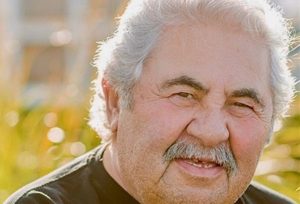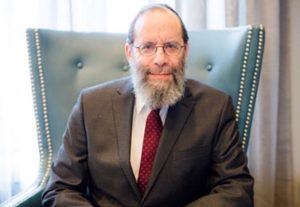Matthew Bronfman, son of the late Canadian-born entrepreneur, philanthropist and Jewish leader Edgar Bronfman, will be in Toronto April 5 to speak at Beth Tzedec Congregation to mark the launch of his father’s book, Why Be Jewish?
During his appearance, which will take place in conversation with Bernie Farber, Bronfman will discuss the book, which was finished by his father in 2013, just weeks before his death. The book details his father’s personal Jewish journey, and despite his father’s secularism, calls on disaffected Jewish youth to explore their heritage.
Bronfman spoke to The CJN about his father’s book and the connection to Judaism that his father embraced later in his life, which did not include a belief in a string-pulling God.
Your father writes about his connection to Judaism, but makes it clear that his Judaism is not about a blind adherence to Halachah, and he rejects the idea of the traditional, biblical God.
He came to believe in godliness, that we find godliness in acts of human kindness, in tikkun olam, and his study was at the core of that. The more he studied, the more he learned, and the more he learned, the more he came to appreciate the values and the morals and the lifestyle in a way, and he found beauty in it.
It never made him believe in that anthropomorphic God – the guy with the white beard pulling strings. He never believed that if you did something bad, you’d go to hell and that if you were tremendous you were going to heaven. I think one of the things he loved was that on Yom Kippur, when you have to atone, you have to atone to a person. I don’t mean to put Catholicism down, but it’s not like you say three Hail Marys and you’re absolved.
READ: Q&A WITH DR. MENACHEM FEUER – SPOTLIGHTING THE SHLEMIEL
This is about human relationships. Even if you look at the Ten Commandments, only the first three are about [a relationship with] man to God. Everything else is man to man. It is about human relations. That is one of the things he came to really love and appreciate about Judaism. One of the things he talked about all the time was that the religion forced you, implored you, to question. We see it in the four questions in the Passover seder. We see it in the way chevrutahs are set up. Everything is about questioning. It is not about blind faith. And over time, as he came to really understand that in a deep way, it gave him an enormous appreciation and love for the traditions and religion. Not in a godly way, but in a way of living.
When he did start learning more and studying, did he make an effort to instil Jewish values in you and your siblings?
When he was 50, he became acting president of the World Jewish Congress, and I think in 1981, he became president of the WJC. Around that time, maybe it didn’t happen until his 60s, he and Rabbi Israel Singer started doing more learning together.
We grew up devoid of religion in the house. We didn’t light candles on Friday night, we were not Shabbat observant, no Hebrew school. I think it made a big difference in our lives. There was definitely a void there.
When he started studying, we were too old by that point. He certainly offered to share it.
Much later in his life, maybe 65 or 70, I’m not sure when, he started doing a weekly Torah study in his office and whoever was in New York was always invited to join, but it was not required. Remember, he was 30 years older than I am, so if he was 65, I was already 35 years old. It’s not like I was a kid in the house, so it was very different. I definitely came to it on my own, as did my brother Adam, but none of the other children did.
Do you see Judaism through the same lens?
I am probably a slightly greater believer that the Torah was in some way shape or form – if not actually written – delivered by God, inspired by something much greater than any human mind could ever have created.
I had a rabbi that I learned with in the early ’90s who basically said, in a funny way, it doesn’t really matter whether you believe it was written by God or written by the great prophets. These are still our stories from which we learn. As long as you’re willing to learn from them, he’s not going to argue with you about the author.
What was it that motivated your father to strengthen his connection to Judaism later in life and work toward instilling that same connection in younger Jews?
It was very much an evolutionary, natural process. The more he learned, the more he liked it and understood it and valued it, and realized how much he had missed as a young person, which inspired him to get involved with Hillel – I think he was the first international chair of Hillel – and to spend a huge amount of time on college campuses. His focus was on getting to people when they were younger so that they would have Jewish opportunities that he felt he had missed and he felt strongly about the fact that he didn’t instill it in his children.
Can you tell me about your father’s commitment to tikkun olam and the idea that people need to take things into their own hands to affect positive change?
I had the opportunity to travel with my dad a fair amount when he did his work with the World Jewish Congress. To see him actually taking action, doing things, it made a huge difference in my life. I think because he didn’t believe in the guy with the white beard in the sky, he understood that one had to take action, and he often cited the quote, “We’re not instructed to complete the work, but we’re certainly not absolved from trying.” That was something he lived by. If you’re fortunate enough to have economic resources to do good work, you have an obligation. He really believed that.
Do you have an answer to the question, “Why be Jewish?”
I think his answer to it is the right one. If you take the time to study, you will learn what a beautiful and inspiring text we have to learn from and to guide us in terms of how to live our lives and how to live our lives in a more moral and ethical way and take care of those who are less fortunate, and it is all there.
As I said at his second memorial, a smaller one at the Israel Museum in Jerusalem – I said at the time that one of the things I love about Judaism is that all of our heroes, every single one of our heroes, was flawed. From Moses to Abraham, Jacob and Isaac, it doesn’t matter. They were human. They were flawed. And my dad was flawed, but he was my hero. It’s a living, real text that we can learn from for our everyday lives and learn how to be better and get through tough times and not to be grandiose in the good times.
READ: ISRAELI ENTREPRENEUR CREATES JEWISH INTENTIONAL COMMUNITIES
When my dad was about 75, I was sitting with Rabbi Adin Steinsaltz, and he was saying nice things about my dad, and you know, I’m very used to that. We’ve all heard it before. But he said, “No, no, no, Matthew. It’s not because your father is a great philanthropist or because your father has done stuff for the World Jewish Congress. I’m talking about the fact that when your father was at an age when most people retired, he started to learn. And it was through his learning that he became the Jewish leader he was. That is why I admire him so much.”
This interview has been edited and condensed for style and clarity.






